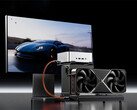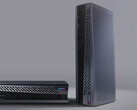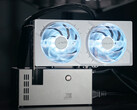A recent video by tech YouTuber ETA Prime demonstrates the performance of the AMD Radeon RX 9070 XT as an external GPU (eGPU) via Oculink. The setup was first tested with a Minisforum MS-A2 mini PC powered by the AMD Ryzen 9 9955HX (16 cores, 32 threads), a system we’ve also reviewed in detail here, and later with Asus’ ROG Ally X handheld, both connected through a Gtbox G-Dock that supports Oculink and USB4.
The motivation behind the experiment is straightforward: the 9955HX provides strong CPU performance but relies on a weak iGPU. By pairing the chip with a high-end desktop card over Oculink, the mini PC gains a significant boost for gaming and content creation. In synthetic benchmarks, the system scored 3,136 points in Geekbench 6 single-core and 18,191 in multi-core, while 3DMark Steel Nomad reached 6,595 points and Time Spy produced a total of 22,653 points.
In comparison, a full tower PC equipped with a Ryzen 7 9800X3D and a Radeon RX 9070 XT achieved around 26,333 points in Time Spy during ETA PRIME’s testing, while Notebookcheck’s own data for the same GPU shows a Time Spy result of 26,837 points. ETA Prime also noted that the tower PC used a 9070 XT from a different OEM, so an exact apples-to-apples comparison cannot be made. Still, he pointed out that the Oculink setup is “losing a little bit of performance” compared to the tower PC, which is expected given the bandwidth limitations versus a direct PCIe x16 connection. Even though the YouTuber downplayed the gap, objectively the difference is notable when comparing the results side by side.
In terms of gaming performance, Cyberpunk 2077 at 1440p Ultra with FSR 4 enabled averaged around 92 FPS. In Borderlands 4, the setup delivered between 75-85 FPS at 1440p Very High with FSR set to Quality. Meanwhile, Marvel Rivals ran between 120-150 FPS at 1440p Ultra with FSR set to Quality. Power draw peaked at around 348 W on the GPU, supported by the dock’s 800 W PSU.
Results with the ROG Ally X, however, highlighted the limits of USB4 bandwidth. In Cyberpunk 2077 at 1440p Ultra with FSR 4 set to Quality, the RX 9070 XT as an eGPU typically delivered between 60-70 FPS, but frame rates often dipped below 50 FPS. Enabling AMD’s frame generation feature nearly doubled the average FPS to around 120, though performance was highly inconsistent, fluctuating between lows of 99 FPS and peaks of 150 FPS, which the YouTuber described as “all over the place.” In comparison, the Oculink connection on the mini PC proved far more stable, reaffirming its advantage over USB4 for eGPU use.
The YouTuber concludes that while this kind of build is not the most cost-effective way to achieve gaming performance, it can be useful for users wanting to share a powerful GPU across multiple systems. For those interested in a closer look at the configuration, benchmarks, and real-world gameplay, the full video is linked below.






























